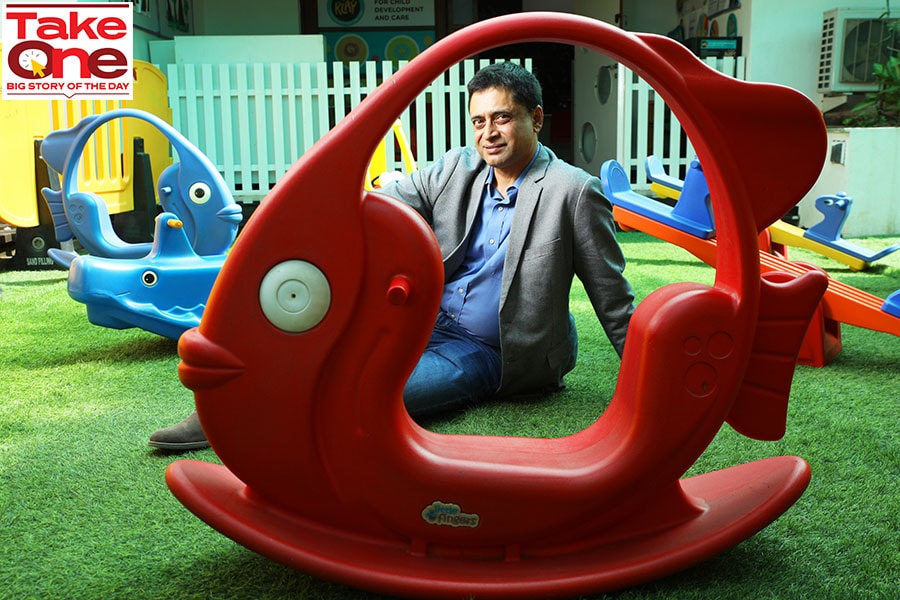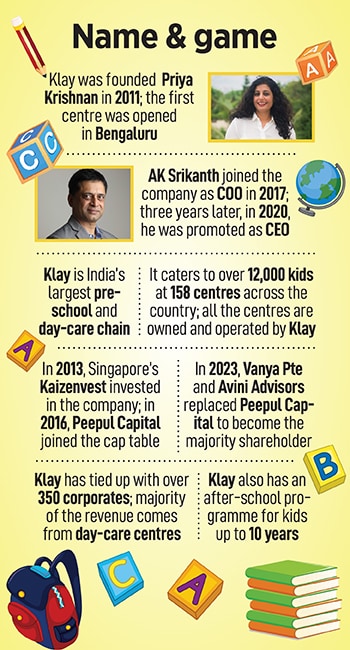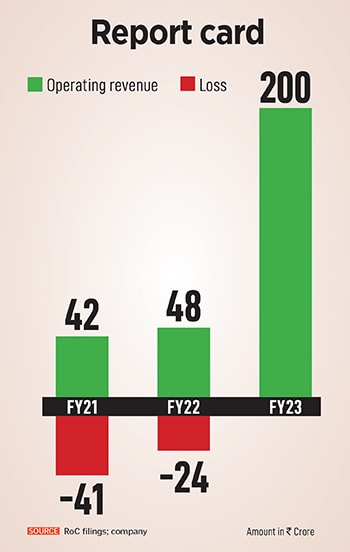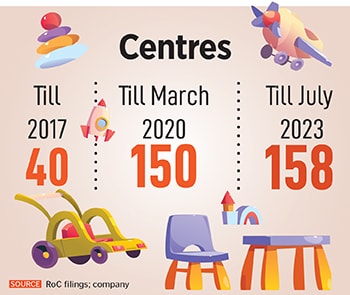
Feat of Klay: Pre-schoolers & priceless lessons
India's largest pre-school and day-care chain survived the pandemic onslaught by sticking to the basics and thinking out of the box. Can Klay now post profits and script a sustainable story?
 Srikanth AK, CEO, KLAY School, Posing for a portrait at the whitefeild Klay School, Bangalore.
Image: Selvaprakash Lakshmanan for Forbes India
Srikanth AK, CEO, KLAY School, Posing for a portrait at the whitefeild Klay School, Bangalore.
Image: Selvaprakash Lakshmanan for Forbes India
Kids love cake, and the grown-ups get fascinated with the icing. Right? A conversation with AK Srikanth is laced with cake and icing, but the sweetest part is when he tells us what happens when the line gets blurred. “The icing on the cake was being misconstrued as the cake itself,” reckons the chief executive of Klay, India’s largest pre-school and day-care chain which was started by Priya Krishnan in 2011. Srikanth explains. It was July 2019. Over 10 months after tying up with Disney, Byju’s rolled out an early learning app for children in classes 1-3 and kids in the age bracket of 6-8 years, and subsequently added more educational content for kids aged 4-5.
Over the next 12 months, the icing on the cake thickened. A year into the pandemic, Byju’s was in the midst of a dream run in terms of funding, valuation, and aggressive expansion. In March 2021, the edtech major introduced the concept of science for kids by using a bunch of fascinating characters from Disney stories—Disney Princess, Frozen, Cars, The Lion King, Toy Story—and tried to make learning engaging for kids. Back in the real world, Shah Rukh Khan was roped in to endorse the product, the fiction and non-fiction seamlessly got merged, and parents got enamoured. Everything looked like a blockbuster script. The story, though, had a fundamental flaw. While a tie-up with Disney was a big plus, reckons Srikanth, it would have stood up to the acid test if the format would have been hybrid in nature—a mix of online and offline.
 Back in 2021, Srikanth went against the grain in terms of thinking and execution. The development of a child, he underlined, has intricate and deep social and emotional bearings. With the onset of the pandemic, the world of education started looking for a quick fix, and assumed that online would be the new reality that would replace brick-and-mortar learning institutions. For Klay, which had grown from Rs 3.4 crore in revenue in FY13 to Rs 191.4 crore in FY20, and had expanded from 40 centres in 2017 to 150 by March 2020, the move to bet on a hybrid play rather than put all their eggs in the online basket was labelled as counter-productive and too risky by critics and analysts.
Back in 2021, Srikanth went against the grain in terms of thinking and execution. The development of a child, he underlined, has intricate and deep social and emotional bearings. With the onset of the pandemic, the world of education started looking for a quick fix, and assumed that online would be the new reality that would replace brick-and-mortar learning institutions. For Klay, which had grown from Rs 3.4 crore in revenue in FY13 to Rs 191.4 crore in FY20, and had expanded from 40 centres in 2017 to 150 by March 2020, the move to bet on a hybrid play rather than put all their eggs in the online basket was labelled as counter-productive and too risky by critics and analysts.
Srikanth, though, didn’t budge. Technology alone, he argued, can at best aid in learning but can’t be the only learning tool. Srikanth—who joined Klay as COO in 2017 and was elevated as CEO just two months into the onset of the pandemic in May 2020—partnered with a South Korean classroom platform, and launched their Learn@Home programme. He also rolled out Klaytopia, a theme-based hands-on activity box for kids between 2 and 6. The product, which reportedly carried a price tag of Rs 1,999 per month, also had components of online learning. “It (technology and online learning) can augment the efficacy of a physical classroom, but it can never replace the physical classroom,” he made his point. Once the lockdown restrictions eased, Srikanth took another counter-intuitive bet and launched the Kare@Home programme, where teachers and caregivers went to the homes of children to impart education. Around 1,000 families across seven cities—Delhi/NCR, Mumbai, Pune, Hyderabad, Chennai and Bengaluru—opted for the out-of-the-box initiative.
 The offline gambit served a dual purpose. First, for the kids who struggled with online learning and engagement, Kare@Home brought in a human touch and tried to replicate the classroom teaching at home. Second, for the teachers and caregivers, it was a lifeline to stay afloat during a period when pre-schools went off the radar for everybody. During the pandemic, the spotlight was on K12 students (secondary and senior secondary), the ones preparing for engineering and medical entrance, and college goers. The kids in primary schools, unfortunately, were ignored. “Deep inside me there was a voice telling me that schools can’t be replaced,” recalls Srikanth.
The offline gambit served a dual purpose. First, for the kids who struggled with online learning and engagement, Kare@Home brought in a human touch and tried to replicate the classroom teaching at home. Second, for the teachers and caregivers, it was a lifeline to stay afloat during a period when pre-schools went off the radar for everybody. During the pandemic, the spotlight was on K12 students (secondary and senior secondary), the ones preparing for engineering and medical entrance, and college goers. The kids in primary schools, unfortunately, were ignored. “Deep inside me there was a voice telling me that schools can’t be replaced,” recalls Srikanth.




 Meanwhile, for Klay, the offline play has seen a heady growth. From Rs 42 crore in FY21, the revenues have leapfrogged to Rs 200 crore in FY23, claims Srikanth, sharing the unaudited numbers for FY23. Interestingly, Klay has not pressed the expansion pedal. The centre count, which was at 150 in March 2020, now stands at 158. Srikanth explains why a sedate approach makes sense. Scaling massively, he points out, can seriously impact the quality of education. It takes a lot of time and money to finalise a centre. Klay, the CEO underlines, runs three kinds of centres. First is the ‘on-site’ model, which are day-cares built on the premises of large companies, and are meant for the kids of the employees. Second is the ‘near work’ model which operates across tech park zones, and centres are close to the offices of the parents. And lastly, there are ‘near home’ centres in residential areas. Hyper aggression for a company which doesn’t have a franchisee model and owns and operates all the centres will not lead to sustainable growth.
Meanwhile, for Klay, the offline play has seen a heady growth. From Rs 42 crore in FY21, the revenues have leapfrogged to Rs 200 crore in FY23, claims Srikanth, sharing the unaudited numbers for FY23. Interestingly, Klay has not pressed the expansion pedal. The centre count, which was at 150 in March 2020, now stands at 158. Srikanth explains why a sedate approach makes sense. Scaling massively, he points out, can seriously impact the quality of education. It takes a lot of time and money to finalise a centre. Klay, the CEO underlines, runs three kinds of centres. First is the ‘on-site’ model, which are day-cares built on the premises of large companies, and are meant for the kids of the employees. Second is the ‘near work’ model which operates across tech park zones, and centres are close to the offices of the parents. And lastly, there are ‘near home’ centres in residential areas. Hyper aggression for a company which doesn’t have a franchisee model and owns and operates all the centres will not lead to sustainable growth. 




